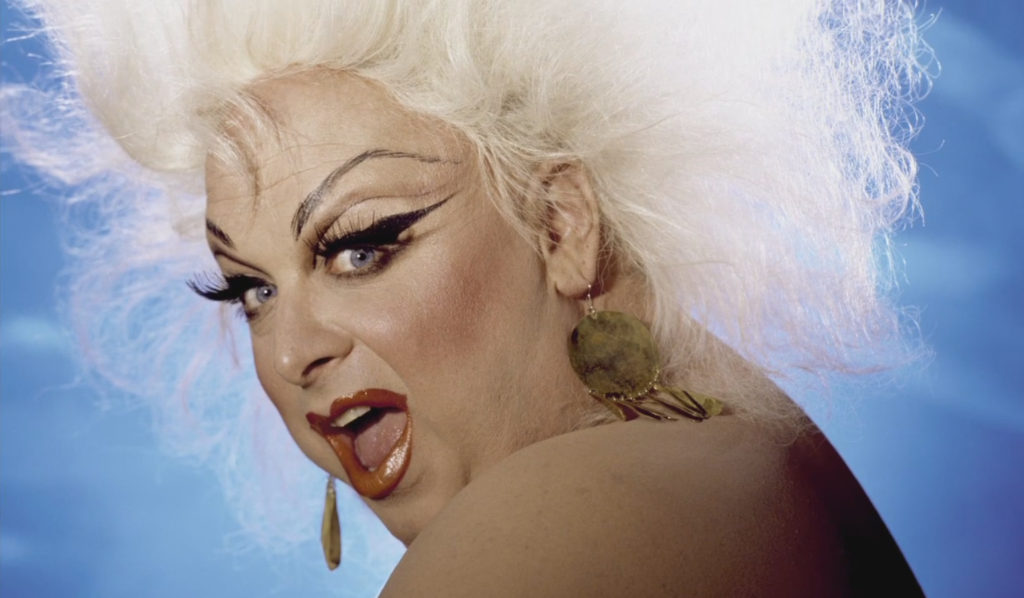I Am Divine review
 Note: In this review I refer to both Glenn and Divine as male, using “He” and “His.” I have done this as Divine’s friend John Waters does the same throughout the film.
Note: In this review I refer to both Glenn and Divine as male, using “He” and “His.” I have done this as Divine’s friend John Waters does the same throughout the film.
Harris Glenn Milstead was born in 1945 to Harris Benard Milstead and Frances Milstead. His parents were socially conservative, upper middle class and brought up young Glenn – they dropped the Harris – in the suburbs of Baltimore.
Glenn didn’t have many friends and was bullied because of his weight and his effeminate nature, but when he met film enthusiast John Waters and his performing band of Dreamland misfits, Glenn’s life was transformed forever. Waters cast Glenn in his second film, Roman Candles, and as if to cement the change, suggested that Glenn adopt the name drag name of Divine.
The rest is history.
And what a good job Jeffrey Schwarz does of laying this history out for us in I Am Divine. This is that rare documentary which manages to be a celebration of a celebrity without feeling hackneyed, hagiographic or sugar coated. This was perhaps easier for Schwarz than many because Divine was already very much about raw honesty and truth, and his friends seem all too happy to share their personal stories openly.
Following Roman Candles, Waters and Divine reunited for Eat Your Makeup, a film which recreated the assassination of John F. Kennedy. In 1968, just a few years after the actual event. And with Jackie Kennedy played by Divine, a man in drag.
To think people still consider that Marilyn Manson and Samuel Bayer‘s Coma White video is controversial.
Together, Waters and Divine, with some extraordinarily daring costuming and make-up from Vin Smith, pushed both the boundaries and the buttons of middle America with this film, and then with the many more they made together.
Schwarz did a great job of speaking to all of the people involved for this film, and made efficient use of his experience in making behind the scenes docs and DVD extras. None of the interviewees disappoint and Waters is, as always, an absolute pleasure to listen to. His contributions are filled with hilarious quips, but also a great deal of emotion. It’s clear that Divine meant a great deal to those that knew him, as well as those that experienced him from afar.
Divine, while an underground figure at the start of his career and hardly a household name when he passed away, was nonetheless an important cultural icon for many people. He was not only an actor, taking roles as both Glenn and Divine, but also a stage performer and singer, and every one of these endeavours was undertaken with the same force of character and freedom.
Divine’s bravery to just do things without fear for their consequences or what people might think of him – the real punk attitude – is what ultimately makes I Am Divine so compelling. It’s made brilliantly clear that Divine’s cult status really meant something for the culture.
Schwarz also manages to uncover the incredibly sweet and emotional story of Divine’s relationship with his parents. I won’t spoil the twists and turns but the film’s moments in which Divine’s mother talks about him and how their relationship changed are incredibly moving. This story is not only deeply personal to Glenn and his mother, it manages to underline the wider influence of Divine.
I Am Divine is an absolute riot at times and a highly entertaining documentary but there’s also real heart to it and a strong story about the importance of the underground, of outsiders and those that depart from the perceived ‘norm.’
I Am Divine is out in UK cinemas this Friday and available on VOD in the US now.